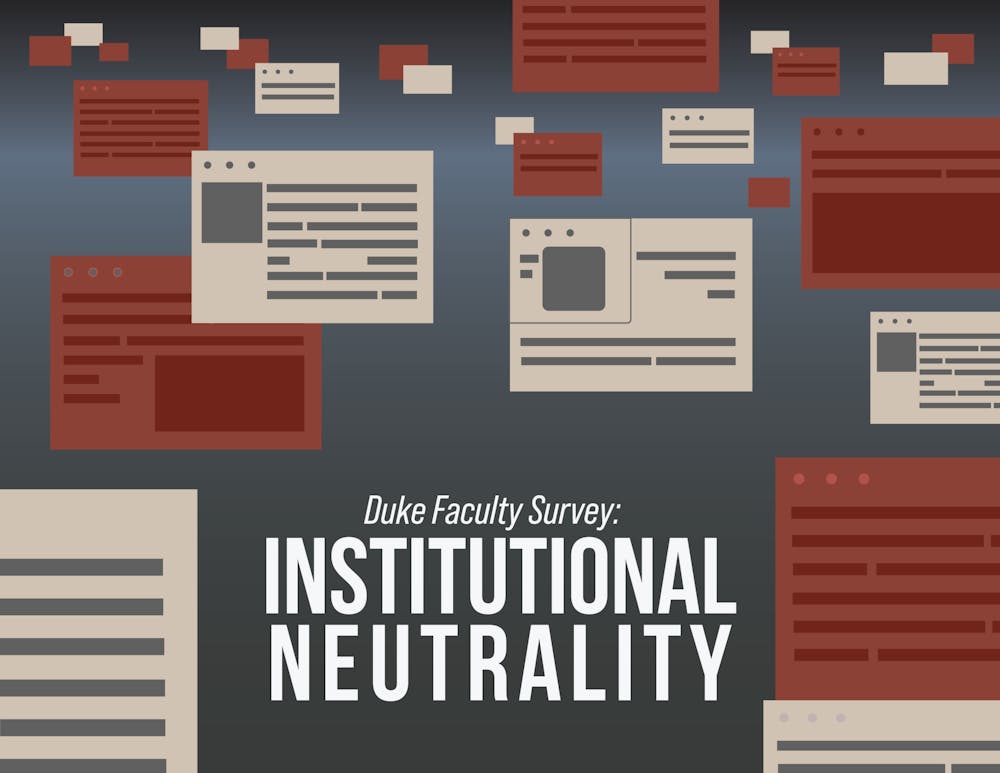Editor's note: This story is part of a series based on a survey of Duke faculty conducted by The Chronicle. You can read more about our methodology and limitations here, or read all of our survey coverage here.
For its first year, The Chronicle surveyed Duke faculty members about their thoughts on institutional neutrality and campus discourse.
We found that faculty members across diverse fields and schools were largely in favor of the University officially committing itself to institutional neutrality, though certain demographics are less likely to support such a policy. Almost 60% of faculty members surveyed did not take Duke’s 2023 campus culture survey.
Institutional neutrality
We provided faculty members with a definition of institutional neutrality summarized from the University of Chicago’s Kalven Report and asked if they would support or oppose a decision by Duke to officially commit itself to institutional neutrality under the provided definition.
In recent months, a handful of elite universities — including Harvard University, the University of Pennsylvania and Northwestern University — have announced policies on institutional neutrality after widespread student protests regarding the Israel-Hamas war in the past year. In September, Stanford’s Board of Trustees commended the faculty senate for passing statements reaffirming the university’s commitment to free speech and calling for institutional restraint in making public statements.
Duke faculty members recently launched a petition advocating for institutional neutrality, which collected over 110 signatories as of Oct. 7. Several faculty members have advocated for the policy at University events, and the Academic Council approved a committee to reexamine the University’s academic freedom policy in April.
Faculty members across diverse fields consistently showed support for institutional neutrality.
A majority of respondents supported officially implementing the provided definition of institutional neutrality at Duke. 40.98% of respondents “strongly” supported the policy’s adoption, 22.81% of respondents were “somewhat” supportive, 16.88% were unsure or neither supported nor opposed the policy, 13.02% were “somewhat” opposed and 6.31% were “strongly” opposed.
The majority of faculty respondents from each school expressed support for Duke officially committing to institutional neutrality. Across schools with at least 20 respondents, faculty members affiliated with the Fuqua School of Business were most likely to support the move, while School of Nursing faculty members were least likely to support the move.
Among respondents from the Trinity College of Arts & Sciences, 39.83% of respondents “strongly” supported adopting institutional neutrality, 23.24% of respondents were “somewhat” supportive, 17.43% were unsure or neither supported nor opposed the policy, 11.62% were “somewhat” opposed and 7.88% were “strongly” opposed. At least half of respondents from each listed Trinity department or field indicated they were “strongly” or “somewhat” supportive of adopting the policy, though low response rates may affect certain fields.
Out of the five individually listed Trinity departments, faculty members from the department of computer science were least likely to support adopting institutional neutrality, while economics faculty respondents were most likely to support the practice. Only four computer science faculty members completed the survey, which likely affected the results. The department of mathematics — which had 13 completed responses out of 92 primary and secondary faculty — was the second least likely to support adopting institutional neutrality.
Get The Chronicle straight to your inbox
Sign up for our weekly newsletter. Cancel at any time.
When combining by field as described on the Trinity website, faculty in the arts and humanities were least likely to support the adoption of institutional policy (57.44% “strongly” or “somewhat” supported), followed by faculty in the sciences (62.96%) and social sciences (72.88%).
Liberal respondents are less likely to support institutional neutrality, as are female and Black faculty members.
Liberal respondents were less likely than conservative respondents to support institutional neutrality — 42.78% of very liberal respondents supported the policy, while 35.56% were opposed. Furthermore, 56.52% of somewhat liberal respondents supported the policy, while 24.08% were opposed. 81.06% of moderate/centrist respondents supported the policy, while 6.85% were opposed.
No “somewhat conservative” respondents were opposed to institutional neutrality, while 90.91% of such respondents supported the policy. Only one respondent identified as “very conservative” (3.33% of all very conservative respondents), and 83.33% of very conservative respondents supported the policy.
Of listed racial identities with over 20 respondents, Black faculty members were least likely to support the adoption of institutional neutrality — 42.86% of Black faculty respondents reported that they would strongly or somewhat support the practice. Meanwhile, 57.14% of Hispanic/Latinx faculty respondents would support the policy’s implementation, 64.13% of white respondents were supportive and 75% of Asian respondents were supportive.
Half of female respondents strongly or somewhat supported implementing institutional neutrality, while 73.31% of male respondents supported the policy. Of the 16 people who self-reported another gender identity, 12 were in favor of institutional neutrality.
You can view additional disaggregations of the data by religion and tenure status on Tableau.
Campus culture survey
Collected from Jan. 29 through March 17, the spring 2024 campus culture survey followed up on the 2021 campus culture survey and aimed “to show where progress has been made and where more effort is needed to create a welcoming, supportive and equitable campus environment.” The Chronicle reported in April that some students and faculty had concerns about the survey’s representativeness due to possible low response rates.
About 58.38% of our survey respondents did not take the campus culture survey.
The demographic distribution of the survey respondents fell within our sample’s margin of error at a 95% confidence level. You can read more about the breakdown by race; gender; religion; opinion on diversity, equity and inclusion efforts; political leanings; tenure status; school affiliation and Trinity field here.

Audrey Wang is a Trinity senior and data editor of The Chronicle's 120th volume. She was previously editor-in-chief for Volume 119.

